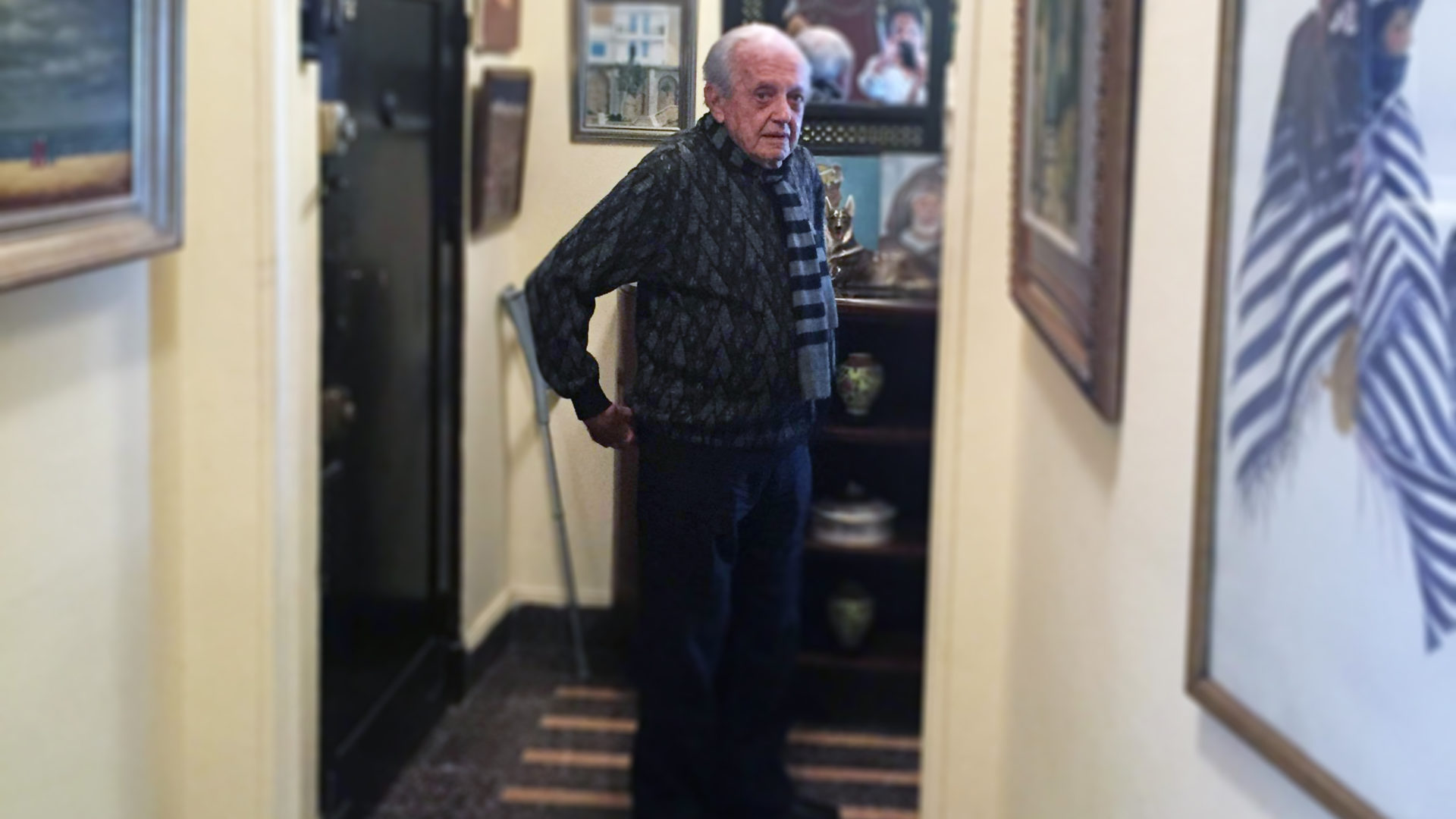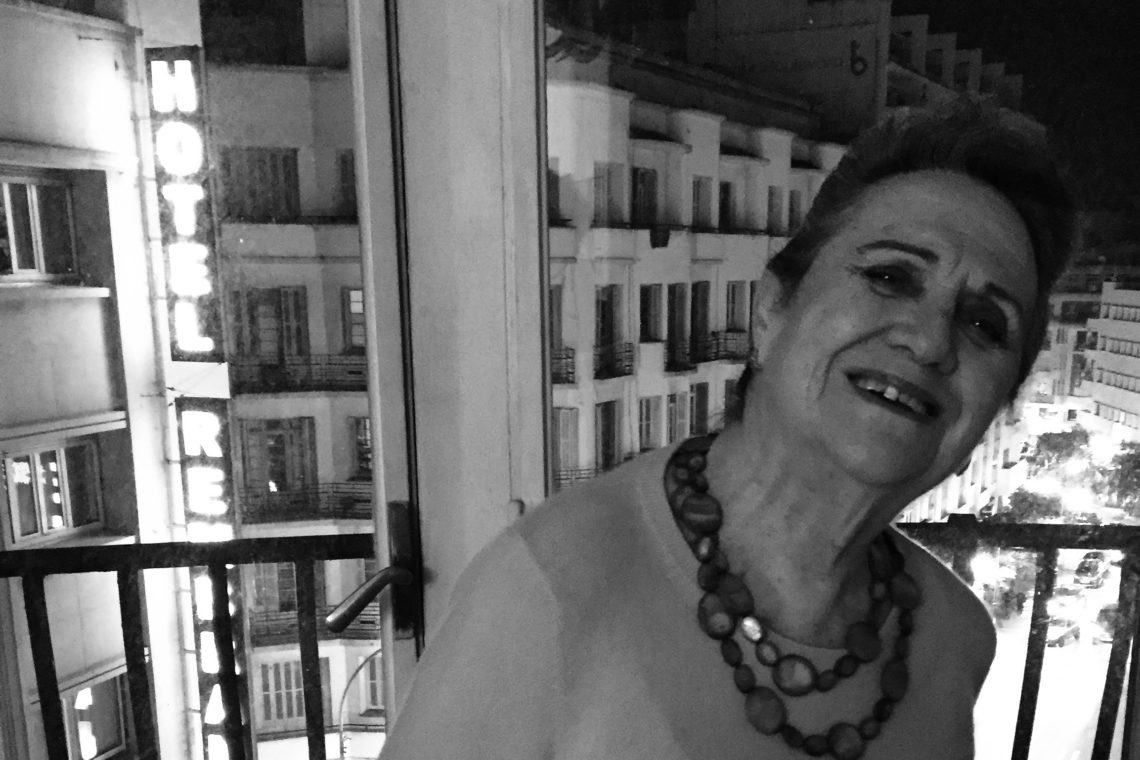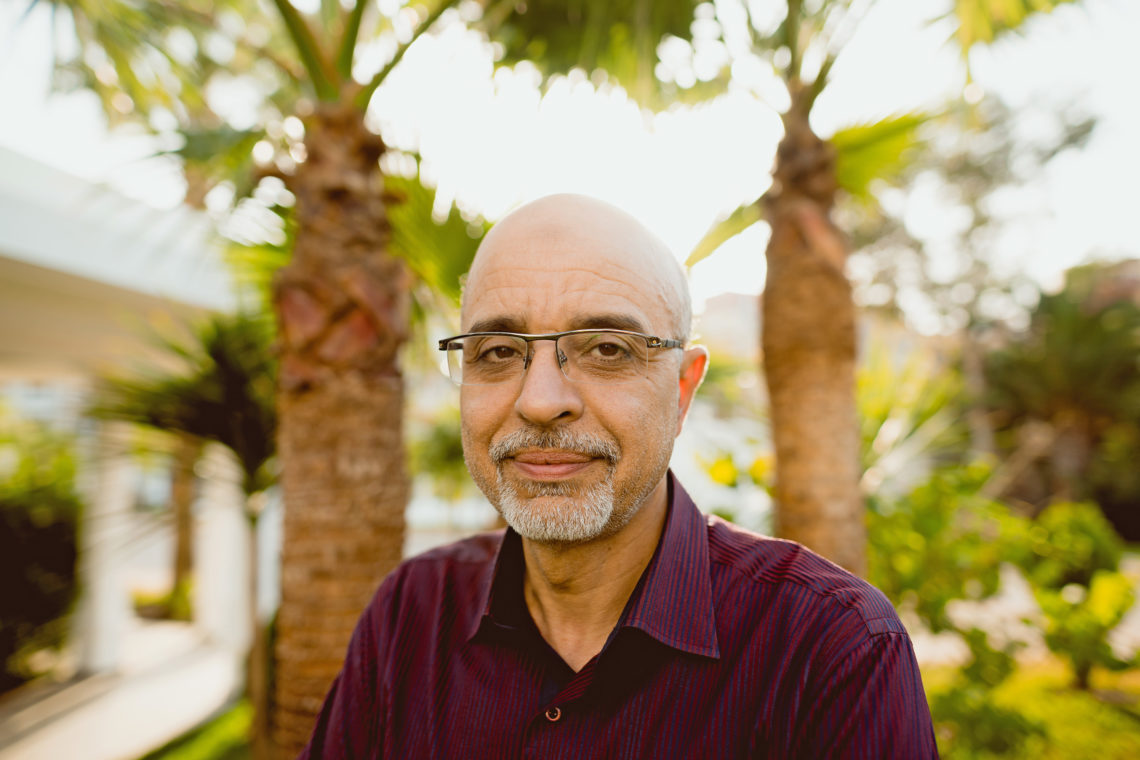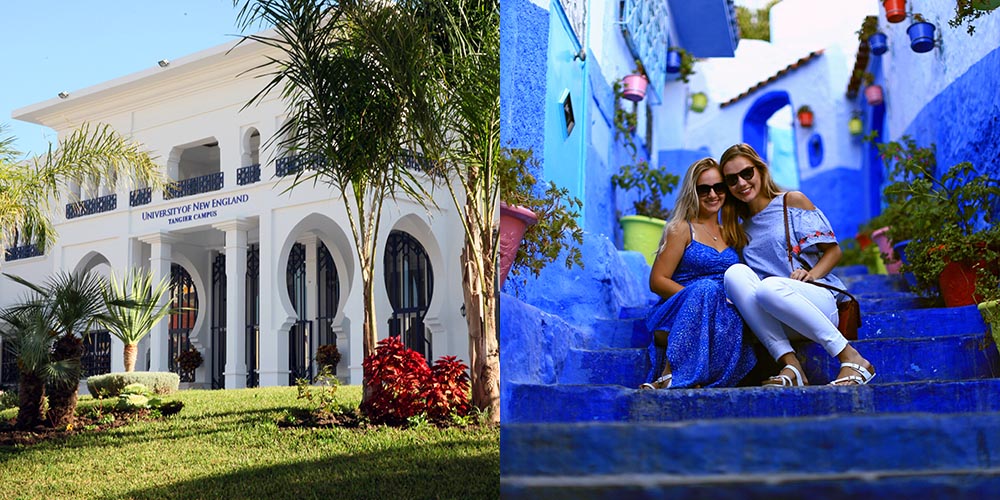Old, broken clocks covered the walls of the Jewish retirement home in Tangier, Morocco. The eight people that inhabited this building were some of the few Jewish people left in this Muslim city. Sam Cohen, dressed in all blue from his scarf down to his shoes, led me down the halls until he briefly stopped at a room with the name “Saudry” written on it. He stepped inside for a brief moment speaking Spanish to the woman living in the room, but I didn’t hear a response back. Then he stepped out saying, “She doesn’t even recognize me. We grew up together and lived in the same building for years,” he laughed as he continued. “She’s a crazy, free-spirited lesbian. A strong woman, too—probably got it from her father the professional boxer. Such a shame that they got her so drugged up now that she’s completely absent.”
Mr. Cohen continued shuffling along down the hall, stopping at each door greeting everyone he passed by. He knew everyone and all of their stories. I couldn’t help but think about what he had just said. That short story he told me about Saudry’s life opened up what Tangier used to be like when it was the International zone—the freedom that it once represented. As we continued, we passed another broken clock frozen in time, making me wonder if this was the end of time for the Jewish religion in Tangier, the last Jew in the city being Mr. Cohen and a few others. With the knowledge that Sam Cohen has from living here his whole life as a Jewish man, he came to represent for me a bygone era of Jewish life in Morocco and how it has changed over time.

Tangier wasn’t always a mainly Muslim city; in fact, it was once a place of religious diversity and a safe place for gays to be who they wanted to be. From 1923 to 1956 Tangier was an International Zone, governed separately from the rest of Morocco by a loose collection of foreign governments. Tangier also had a highly heterogeneous population that included 40,000 Muslims, 20,000 Spanish, 6,000 French, and 5,000 other Europeans. Jews, especially, have old ties and history to both Morocco and Tangier.
Back in 1492, the Jews were expelled from Spain. The charter signed by the Spanish declared that no Jews were allowed to remain within the Kingdom unless they converted to Catholicism; only converts could stay. Whether they were rich or poor did not matter, all Jews had to convert or leave. Many of them retreated to North Africa. After hundreds of years, Jews were finally permitted to return to Spain after the abolition of the Inquisition in 1834 and the creation of a new constitution that allowed for the practice of faiths other than Catholicism.
With the outbreak of the Spanish Civil War in 1936, fearful of fascism, many Jews who had settled in Tetouan fled to Casablanca or Tangier, or other parts of Morocco. This was because Tetouan was a part of Spain at this time. With the outbreak of the Second World War and the fall of France, in 1941, most Jews that had gone Casablanca ended up going to Tangier to escape the Germans. They knew that Tangier was the International Zone and felt safe here.
In 1956, Tangier became a part of Morocco, which led to many of the Jews to immigrate to Israel or France, either out of fear of living in a Muslim country or, for most, because the banks and other industries closed where they worked. Immigration to Israel jumped from 8,171 in 1954 to 24,994 in 1955 and increased even more in the wake of the 1956 war between Egypt and Israel. In 1956, the government banned immigration to Israel until 1961, but people were still immigrating illegally. By 1961, the government relaxed the laws on immigration to Israel, as part of an agreement with Israel that forced Israel to pay Morocco for each Jew who left for Israel. Over the next three years, more than 80,000 Moroccan Jews immigrated to Israel. By 1967, only 60,000 Jews remained in Morocco.
The disappearance of Jewish life in Tangier was even more dramatic, with a mere 250 Jews left in the city by 1970. Since then, the Jewish institutions have gradually disappeared, due to the lack of local demand but also because Tangier was no longer the international city it once was. In more recent years, more fled on account of rising Islamic radicalism and the city’s extreme poverty. An angry mob marched in the streets, chanting for a holy war against the Jews. King Muhammad VI warned Muslims not to abuse Jews, placing armed guards around remaining Jewish institutions. In 2005 fewer than 150 Jews remained, most of them elderly like Sam Cohen and the people in the retirement home. It is quite possible that within a decade no Jews will remain in Tangier.
The first time I met Sam Cohen was at the University of New England. There was a knock on the classroom door, and in walks a 90-year-old man dressed in all blue; even his scarf was printed with blue anchors. He slowly made his way over to the chair set up for him at the front of the room. He looked up and smiled, “Hello! My English isn’t the greatest, so I’m sorry in advance if you can’t understand me very well. My name is Sam Cohen.” I remember thinking that he seemed to speak English pretty well for someone who said he wasn’t very good at it. Mr. Cohen proceeded to tell us about his childhood growing up as a Jew in a Muslim country and how he ended up living in Tangier.
“My family has been living in Morocco for over 500 years because my great, great, great grandparents were expelled from Spain in 1492; they didn’t want to convert from Judaism. And for as long as anyone could remember, things were fine for Jews. When I was a little boy, I grew up in Tetouan,” he continued, “and we had no problems with any of the Arabs; everyone was friendly to us even though we were Jewish. It just wasn’t an issue from what I can remember,” he shrugged as he adjusted his position in the chair. “The next thing I knew, at the age of ten we had to move away from Tetouan. I didn’t understand why at first, but it was because the Spanish Civil War had broken out in 1936. Since Tetouan belonged to Spain at the time, the war was going to affect us too.”
“Where did you end up going?” a student shouted out in curiosity.
“My family moved to Casablanca,” replied Mr. Cohen, “we went there because my mother had some friends who lived there, and she wanted to be near friends.” He paused for a moment, thinking back on his years in Casablanca and smiled, “We had a nice life in Casablanca. We didn’t have much, though, just our beds and a table to eat on. It was simple, but I liked it.”
I raised my hand. “Was it much different from living where you used to in Tetouan?” I had visited Tetouan, a city two hours east of Tangier, and could visualize his life in the warren-like medina.
“The biggest adjustment for me,” he replied, “was having to learn French because I had to go to a French school. It wasn’t too hard from what I remember since I was pretty young. In Tetouan, we spoke Spanish, so that was all I knew. Now I am fluent in both French and Spanish.”
A student’s hand shot up, and Mr. Cohen called on her. “How were you treated in Casablanca?” she asked.
Mr. Cohen stopped for a moment looking for the words, and as he began to speak, he was laughing. “Once I was walking with my dad on the Sabbath, and an Arab insulted us by calling his donkey a Jew.” Mr. Cohen laughed some more. “To teach this man a lesson, my father took the Arab’s donkey and said, ‘Well if the donkey is Jewish, then it can’t work on Saturday!’”
Everyone in the room shared a laugh, but then he continued, “But other than this one story, we were treated perfectly fine. We only stayed in Casablanca for four years, though, because in 1941 the war in Europe started: France fell, and the Nazis were coming to Casablanca. There was a sense of panic from what I can remember. All I knew was that my parents wanted to get out of there before it was too late. So, that night we gathered our belongings and got onto a boat that brought us to Tangier.”
Another student curiously asked, “Why did you go to Tangier? Isn’t that close to Casablanca?”
“Back then, you see, Tangier was the International Zone. People had the choice of who they wanted to be. It was going to be the safest place for my family and me at the time. My father also had a sister here. With family connections, we felt we wouldn’t be alone. Since then, I have been here. I grew up here in Tangier, and I wouldn’t want to be anywhere else.”
The class was ending so everyone started saying their goodbyes to Mr. Cohen and thanking him for coming in. I sat there for a moment reflecting on what I had just heard. This man had lived through the history of the city where I had been living for months. I was fascinated by his first-hand experience of having to move from city to city due to his faith. His life was one you’d read about in a book or watch in a movie. It intrigued me so much that I wanted to know more.
“Excuse me, Mr. Cohen?” I asked as I walked up toward the front of the room.
“Yes?” he replied.
“I was wondering if we could get together some time and talk more about your life in the past and present. Would that be okay?”
Mr. Cohen smiled and said, “Of course! I would love that. My driver is here right now to take me back to my house. Would you like to come with me so I can show you around and you could meet my wife as well?”
I eagerly agreed, and we walked out of the classroom. Leaving the building and approaching the school gate, I saw a black car waiting right outside. The guard opened the gate for us, and once we got to the car, a woman stepped out of the front passenger seat and greeted Mr. Cohen and me. She then opened the door, and Mr. Cohen sat in the front, and she sat in the back with me.
Before I could say anything else, he turned and said, “How would you like to come with me to visit the Jewish retirement home here before we head to my home? It’ll be quick.”
“Yes, I’d love to!” I answered without hesitation.
Mr. Cohen warned me not to have high expectations. “There used to be twenty Jews living there, but now there are only eight.”
We pulled up to the retirement home and, entering, the first thing I noticed was how beautiful the garden was. It was such a magnificent outdoor space, making me wonder why no one was outside enjoying the beautiful day. Then we were ushered inside. Upon walking in, an old woman, whose head came up to my shoulders, greeted us. She only spoke Spanish, but I could pick out a few of the words she was saying. She introduced herself as Christine and explained how she grew up in the building and had lived here for 75 years. She was now 82. She was not Jewish herself, but she helped run the place and take care of it ever since she was little. Mr. Cohen and Christine then began to lead me through the building.
Mr. Cohen knew absolutely everything about everyone. As we passed by rooms, he would explain their stories and how they ended up there. Sam seemed to have a special connection with each of them. People would come out of their rooms just for a quick hello; it was amazing to see how loved he was by every one of them.
After half an hour, he left the building and walked up the stairs to get back to the main road. I looked at the garden one more time admiring its beauty. Sure enough, the black car was waiting for us, and we got in.
Not too long after we pulled up to an apartment complex and got out.
“This is where I live,” Mr. Cohen said as we began walking inside, “I have lived here most of my life with my wife. These days it’s harder than it used to be for me to get to my apartment since we have no elevators.” As he began his slow ascent, I stared up the long spiral staircase up and then back to Mr. Cohen. How could this 90-year-old walk up four flights of stairs every day? I walked behind him flight by flight.
“This building used to be occupied by all Jews,” Mr. Cohen said as he took a break halfway up, “but now we are the only Jews left living in this building.”
We finally reached the top, and Mr. Cohen let out a sigh of relief. “Here, this one is my apartment.” He opened the door, and we walked in. I couldn’t believe what I was looking at. There was not a space on the red walls that didn’t have a painting or photo. The entire apartment felt like a museum to Old Tangier.
Directly to the left of the entrance was his bedroom where his wife was lying in bed. She was mostly bed-ridden and had trouble walking.
“Hola!” she greeted me, “pardon me, I don’t speak English very well.”
“Hello! And no worries! It’s very nice to meet you; your home is beautiful,” I responded.
Mr. Cohen ushered me down the small hallway opening up into a dining and living rooms. The walls and shelves in both rooms were decorated with more artwork, pictures, and a whole arrangement of other decorations. He started to bring me to specific pieces and tell me about them.
“Those three paintings are of my two daughters and son,” he pointed up toward the top of the wall.
“Do they live here in Tangier with you?”
“No, one of my daughters and my son live in Paris.” The two are, respectively, an economist and computer scientist. “My other daughter lives in Montréal and works for Air Canada. They are all married and have kids of their own.” He moved onto a set of nine pictures hanging on the wall in the living room. “These are all of my grandkids right here.”
I smiled at him and looked at the pictures again. He then moved and started walking toward a glass cabinet filled with only blue glass vases, antiques, and cups. I followed him over.
“What is this?” I asked
“This is our blue glass collection; it’s my wife’s favorite color.” I started to wonder if that was why he was always dressed head to toe in blue.
The next few pictures he showed me was of his wedding, and then he headed over to a small table that was full of little picture frames. “These are pictures of all our family members who had passed away.” He then pointed toward an identical set up on another table. “And these are all of our friends who have passed away.”
I noticed melancholy on his face when he looked at pictures of people who had meant so much to him. Loss must be a terrible thing. After looking around the room a little bit longer, he made his way over to a yellowing picture on the wall. He was looking at it for a while, and then as I approached he began to say, “This one here is a photograph of me as a child in Paris. Right in front of the Eiffel Tower, you see,” he said, pointing to the photograph. It was in black and white and showed Mr. Cohen in a top hat with a cigar hanging out of his mouth.
He motioned me over, and we sat down at his dining room table where he began telling me about his life in Tangier.
“What did your parents do for work in Tangier?” I asked to start off the conversation.
“My mother stayed at home and took care of the kids and the house. My father owned a jewelry shop here.”
“What was your relationship like with them?”
“My mother and I got along very well. I loved her very much. My father and I, on the other hand, did not get along that well.”
“Why?”
“He was a very religious man. He would get angry with me because he wanted me to take more of a part in the Jewish religion, but I just didn’t want to. I still loved him very much, though. He ended up passing away at the age of 70, and my mother passed away at the age of 90.”
Mr. Cohen reached over and offered me a cracker. I thought about what else I wanted to ask. “How was it for you when Tangier no longer was the International Zone?”
“I had no big issue at all when it was changing,” he began. “I was 30-years-old when all of this was happening. Most of my friends and family were leaving because they didn’t know how it would be to live in an Arab world as a Jew. They thought they wouldn’t be able to practice their faith, but there was never an issue with that here. My uncle told me that if I stayed in Tangier, I would see donkeys walking down the street and all traces of modern life would be gone,” he chuckled to himself as that memory resurfaced.
“Why did you stay?” I asked. “Was it hard to watch all your friends and family leave?”
“Yes, it was hard to watch them go, but since I loved Morocco and I loved Tangier, I couldn’t leave. Also, I had just gotten married, and my wife was pregnant. We did leave for one year, though, because I wanted a new experience at the time and I wanted to see some of my friends.So we moved to Madrid. I did not like it, so we headed home to Tangier after the year. Now looking back, a lot of people who left lost all of their money. That’s one of the reasons why we are also happy we stayed. Also, our friends are here. I am friends with all of the Muslims, and they have never been anything but kind to me; in fact, just the other day I had tea with one of my Muslim friends,” he said then picked up his Coke for a sip. “Would you like a drink?”
“Yes please.”
Mr. Cohen called his helper over, and she brought me a Coke with a glass of ice. She was a very nice woman, and I could tell with her interactions with Mr. Cohen that they all loved each other and she was a part of their family. I looked back over at Mr. Cohen and said, “So are you glad you stayed?”
“Yes, it was the best decision I made in my life.”
“No regrets at all?”
“None.”
“That’s good to hear,” I said as I smiled and continued with my next question. “Where did you use to work?”
“I worked for a big company named Bland. I was the director of the company’s shipping and tourism from Tangier to Gibraltar. It was a good job, but I am retired now.”
“What do you do now around Tangier that you’re not working?” I took a sip of my drink.
“I am never bored,” he began with a big smile on his face. “I always have something to do. I play bridge three times a week, I’ll go out to the country to drink mint tea, I get lunch in the mountains, I play tennis and golf sometimes, and I just don’t go out at night unless it’s for a special occasion. The only problem I have is that my family isn’t here.”
“Do you miss your kids a lot? Do you ever get to see them?”
“Yes I do,” he began, “but I do go and visit them six months out of the year. In just a week I’ll be going to Paris to see my son and daughter. Then I’ll come back in January for some time and head to Montréal to visit my other daughter. It is always nice to go and visit them, but whenever I come back to Tangier, I am happy. My kids even tell me that it looks like I’m going to paradise when I’m heading home,” he chuckled.
I looked at the time, and it was 4:00. “It has been a pleasure talking with you,” I said, “but I do have to head out to get to class at 4:30.”
“No problem! Thank you for coming over and talking with me.”
We shook hands, and he walked me towards the door. I turned around and said goodbye to his wife as well. When Mr. Cohen opened the door for me, I thanked him again.
Thinking back on that day I spent with Mr. Cohen, I see in my mind the broken clocks frozen in time in the Jewish nursing home. The clocks represent for me a time I will never forget. I feel privileged to have met Mr. Cohen and shared his world, if only briefly. Rarely have I ever met anyone so proud and happy to live where he lives and who is so well-loved by average people on the street. Maybe his happiness is the consequence of staying behind in a city he loves, while most Jews and Europeans fled out of fear. Sometimes you have to make sacrifices for things that you love.





Very interesting encounter. Good thing he toured you the retirement home and his home.
A few notes about the anti-Jewish sentiment in the Muslim world is that it’s stemming from the atrocities that are being committed against the Palestinians in Israel. An IDF defector in an interview with journalist Abby Martin declared that the Mossad (Israeli intelligence) used to send some of its agents to bug and harrass Jews outside of synagogues to force them to immigrate to Israel. They didn’t want to leave because of the wealth they have gathered here in Morocco and because of the quality of life that they had here. It was very difficult for many of them to get settled in Israel since they had to put up with a more rudimental kind of life lacking many household necessities like an oven.